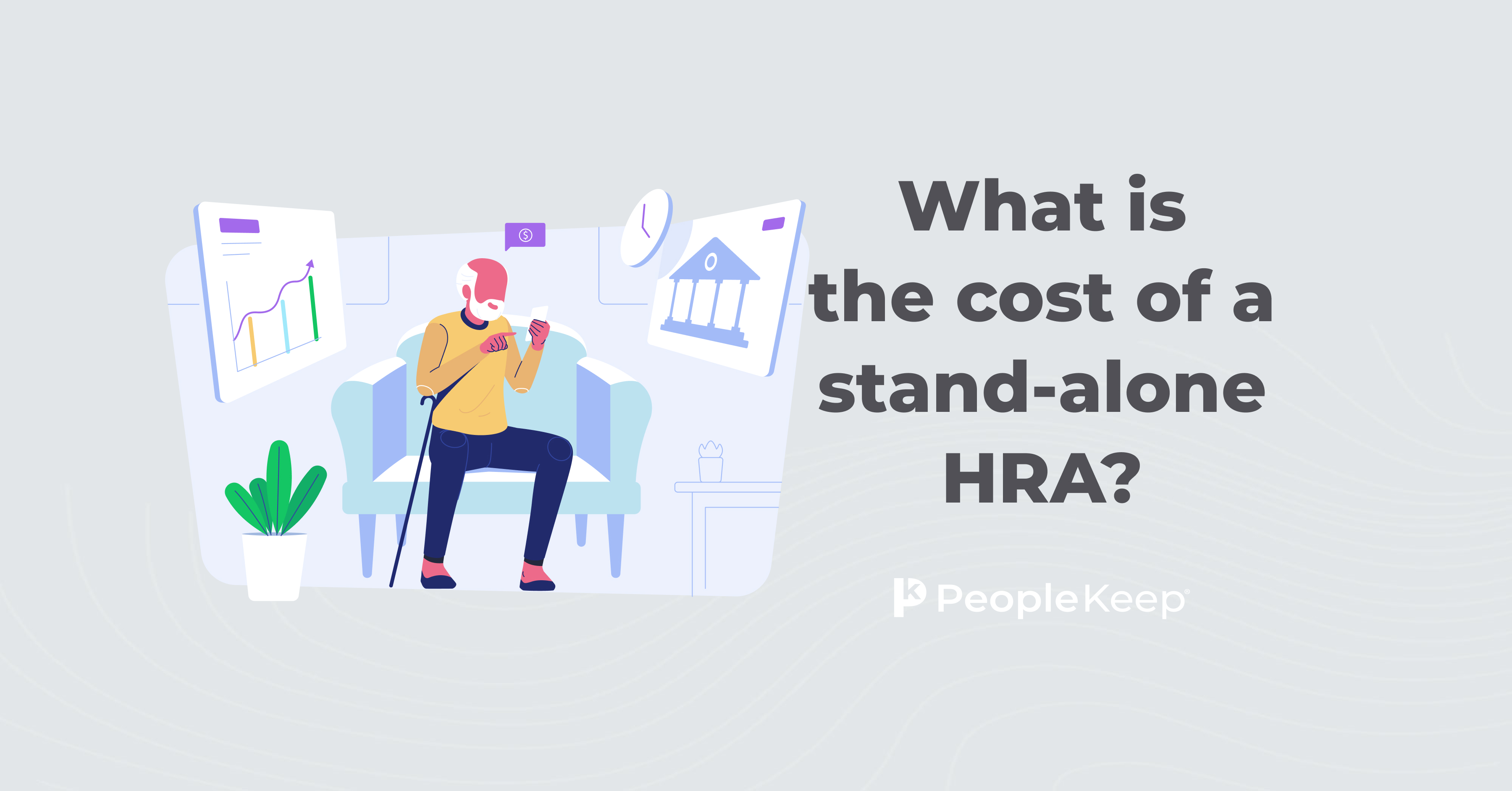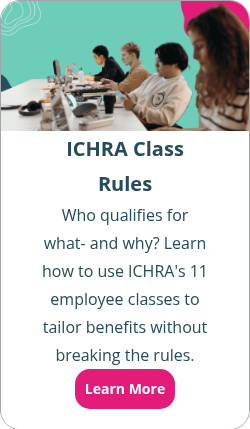The ICHRA and premium tax credits: what are the rules?
By Holly Bengfort on June 2, 2023 at 7:20 AM
Editor's note: We updated this article in September 2024 to include the latest ICHRA affordability numbers for 2026.
Employees participating in an individual coverage health reimbursement arrangement (ICHRA) can’t collect premium tax credits (PTC). However, simply being offered an ICHRA doesn’t automatically disqualify employees from utilizing tax credits under specific circumstances.
With an ICHRA, the allowance amount you offer your employees can impact their premium tax credit eligibility. If they’re offered an ICHRA allowance that's considered affordable, they must give up their premium tax credits. However, if they’re offered an unaffordable allowance, they can opt out of the ICHRA and continue receiving their tax credits.
In this article, we'll go over what the ICHRA regulations say about premium tax credits, how premium tax credits are affected by ICHRA availability, and what employees must do to opt-in or out of the benefit.
What is an ICHRA?
An individual coverage HRA (ICHRA) is a cost-effective alternative to traditional group health plan coverage. It's a health reimbursement arrangement (HRA) that employees can use to cover the cost of their individual health insurance coverage. Employees must be covered by an individual market coverage policy that qualifies as minimum essential coverage (MEC) to participate in an ICHRA. Employers can then reimburse employees on a pre-tax basis for their individual health insurance premiums and other eligible expenses.
Organizations of all sizes can offer an ICHRA. Employers can set eligibility requirements and allowance amounts based on different employee classes.
Plus, there are no caps on annual allowances, so you can offer whatever reimbursement amounts you would like to each employee class.
What do the ICHRA regulations say?
The ICHRA regulations are clear in their handling of premium tax credits. According to the U.S. Departments of Health and Human Services, Labor, and the Treasury, an employee is ineligible for their premium tax credits for the month if they’re eligible for an ICHRA that is considered “affordable” and provides minimum value for the month.
Additionally, an employee (or any member of the employee's family) can't collect premium tax credits if they participate in an ICHRA, regardless of how affordable or valuable the benefit is.
If an ICHRA doesn’t meet specific requirements, employees do have a choice, though. They can opt out of the ICHRA and collect their premium tax credits, provided the benefit qualifies as “unaffordable” under the definition laid out in the Affordable Care Act (ACA).
The regulations set by the Departments of Health and Human Services, Labor, and Treasury express that employees must be allowed to make the decision to opt out annually and must make their decision before the ICHRA plan start date.
Now, let's explore what these guidelines look like in practice.
Calculating affordability with an ICHRA
The most important step for employers considering offering an ICHRA is to determine if the allowance they plan to offer their employees meets the affordability requirement.
If you offer an affordable ICHRA, employees can’t collect tax credits even if they opt out of the benefit. If the ICHRA is unaffordable, though, they can choose to opt out and use those credits.
For 2026, an ICHRA is considered “affordable” when an employee has to contribute no more than 9.96% of their household income toward the purchase of a self-only silver-level Marketplace plan. This is up from 9.02% in 2025.
However, when choosing an ICHRA allowance to offer, you likely don’t know your employees’ household incomes. You can use the federal poverty level (FPL) as a safe harbor benchmark for determining if your ICHRA is affordable for ACA rules. If using that guidepost, the FPL dictates that your employees’ share toward their individual insurance plan costs must be no more than $129.90 per month in 2026, up from $113.20 in 2025.
Your employees will use a different calculation to determine if the ICHRA is affordable for them.
Affordability calculations can be made using the following formula:
Household income * .0996 = X
X/12 = Y
Lowest cost silver plan - Y = minimum affordable ICHRA monthly allowance
You can also use our ICHRA affordability calculator if your state uses the federal insurance Marketplace.
ICHRA affordability example
Colin is an employee with Brower Construction Company, which pays him $60,000 annually. Brower Construction plans to offer an ICHRA for its employees with a monthly allowance of $100 for single employees. Colin would otherwise qualify for premium tax credits, so he must decide if the allowance is considered affordable or unaffordable.
The lowest cost silver-level plan available on the exchange in Colin's area is $400 each month, which means his required contribution with this benefit is $300. Colin's monthly income is $5,000. In order for his ICHRA benefit to be considered affordable, the most he can contribute toward an individual premium after using his ICHRA allowance should be $498, which is $5,000 multiplied by 9.96%.
Because $498 is more than the required employee contribution of $300, Colin's ICHRA benefit is considered affordable. This means that he can’t waive the benefit and collect his premium tax credits.
Wayne is another Brower Construction Company employee who qualifies for premium tax credits. Together, he and his wife earn $30,000 a year. One-twelfth of his income is $2,500; multiplied by 9.96%, the figure is $249. Because $249 is less than the required contribution of $300, Wayne's ICHRA benefit isn't considered affordable. That means he can waive ICHRA participation and collect his premium tax credits instead.
For purposes of this calculation, the ICHRA regulations state that employees must calculate roughly what they expect to earn on a monthly basis through the taxable year.
They must then choose to keep or waive the ICHRA before the benefit plan year begins.
Waiving premium tax credits in favor of the ICHRA
Employees who are otherwise eligible for premium tax credits may choose to waive access to those credits and participate in the ICHRA.
There are no formal requirements for employees who choose this path. Simply by choosing to participate in the ICHRA, employees are waiving their rights to premium tax credits.
Employees can reevaluate their choice and choose to opt out of the ICHRA in advance of the next plan year, but they can't opt out midyear and then collect premium tax credits.
In our example above, Colin would take this path.
Opting out of the ICHRA in favor of premium tax credits
Employees whose ICHRA benefit is unaffordable may want to opt out of the ICHRA and collect premium tax credits instead. To do this, they must inform their company before the ICHRA plan start date. This choice applies to both the employee and their family.
Once they opt out of the ICHRA, they're free to collect their premium tax credits without any qualification.
Employees can reevaluate their choice and choose to participate in the ICHRA during the next plan year, but once they've chosen to opt out, they can't participate for the rest of that plan year.
In our example above, Wayne would take this path on behalf of himself and his wife.
Premium tax credits and the ICHRA notice requirement
Premium tax credit availability is one of the most important considerations employees must make with regard to the ICHRA. The federal government requires that employers offering an ICHRA send employees a notice about the benefit that explains how the ICHRA affects premium tax credits.
The ICHRA notice covers many items, but its primary purpose is to help educate employees about their options regarding premium tax credits.
Employers should be ready to fulfill this requirement and offer any help their workers may need.
Other types of HRAs
If you find that an ICHRA isn't the best fit overall for your organization, you have other HRAs to choose from. Let's examine two popular HRA options.
Qualified small employer HRA (QSEHRA)
A QSEHRA is a company-funded benefit that was designed with small business owners in mind. It's only available to eligible employers with fewer than 50 full-time equivalent employees (FTEs) who want to offer tax-free reimbursements to their employees for their premium payments and other out-of-pocket expenses.
With a QSEHRA, all FTEs are automatically enrolled in the benefit. This means employees who receive financial assistance through premium tax credits can't choose to opt out of a QSEHRA in order to collect their full premium tax credit. Instead, they have to reduce their credit, dollar-for-dollar, by their monthly HRA allowance.
Employers can choose to include part-time employees in this benefit. But if they do, they must offer these employee benefits on the same terms as all full-time employees.
While there's no minimum limit for employer contributions, there are annual contribution limits with a QSEHRA.
Group coverage HRA (GCHRA)
A GCHRA, also known as an integrated HRA, is designed to work alongside a traditional group health plan. It doesn’t work with individual Marketplace policies or premium tax credits. With a GCHRA, employers offer the group health insurance of their choosing and extend their employees' health coverage with a benefit allowance. Employees can only be reimbursed for out-of-pocket costs for medical expenses, not monthly premiums. This helps employees save money before reaching their deductible and also provides cost control for employers.
Conclusion
With the ICHRA, the federal government has offered some much-appreciated flexibility when it comes to premium tax credits. If the ICHRA you offer isn't affordable, your employee can opt out of the benefit and receive their premium tax credit instead. However, if your ICHRA is considered affordable, your employees won't have the option to opt out and, therefore, won't receive their tax credits. Additionally, your employees who opt-in to the ICHRA can't continue to collect premium tax credits.
If you choose to go with a QSEHRA over an ICHRA, your employees with premium tax credits would have to lower their credit, dollar-for-dollar, by their monthly HRA allowance. With a GCHRA, you can supplement your company's group health insurance plan to further support medical coverage for your employees.
This article was originally published on July 23, 2019. It was last updated on June 2, 2023.
Check out more resources
See these related articles

What is the cost of a stand-alone HRA?
Looking to budget for a stand-alone HRA? Get all the information you need on pricing and expenses in this comprehensive guide.

What is a healthcare benefit allowance?
Learn what a healthcare benefit allowance is and how it can help employees cover medical expenses. Discover how health allowances work for businesses.

What is an ICHRA?
What is an ICHRA, and how does it work? Find out everything you need to know about this innovative healthcare option: the individual coverage HRA.



